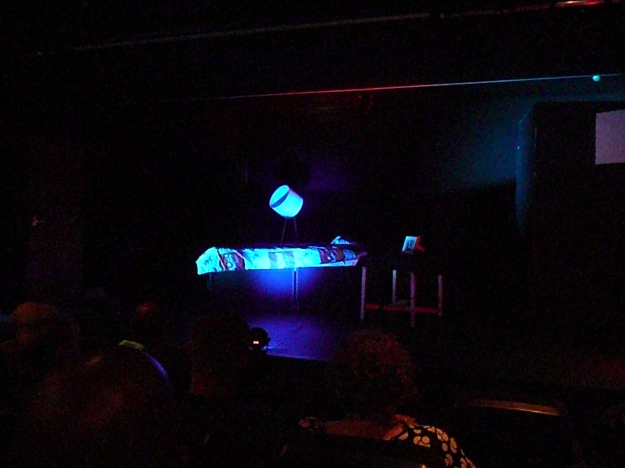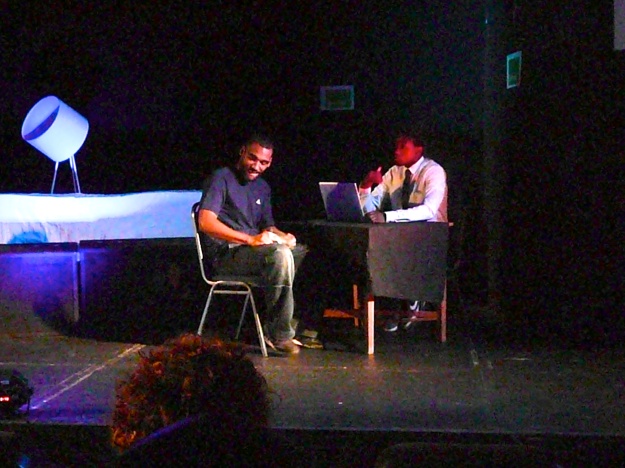Becoming X
“In nature there are neither rewards nor punishments; there are only consequences.”
Becoming X is the latest production from the visionary Recre8, a Psychology based Drama Company. While it has nothing much to do with either sneakers or pimps, it has much to do with the trials of becoming the unknown person that is your future self. The most important thing it has do with is the rehabilitation of young people, those who have become immersed in gang culture, or crime in some way and have been subject of a court order, or are rehabilitating ex-offenders. Recre8 are an organisation that run a range of programs that are aimed at enabling young people to explore their issues in an emotionally safe environment and to heighten their awareness about the consequences relating to their offending behavior and in doing so create some great theatre. The cast was a mixture of young people from Birmingham Youth Offending Services and full time drama students, who work together on the creative process that has produced this drama.
The Custard Factory Theatre was the ideal space to showcase the latest Recre8 production, an intimate theatre, enthusiastically overflowing with people like it was the last helicopter out of Saigon. The over-full house only added to the anticipation and brought audience and actors closely together in a claustrophobic darkness – creating a sense of confinement that totally suited the themes of the drama, a drama that played out in an atmosphere that crackled like a loose earth.
The creation of the play began in the crucible of improvised drama workshops, where some of the cast were given potential scenarios and the resulting sketches were worked on by professional script writer Matt Ford who developed these ideas and fashioned them into the cogent narrative that is at the heart of Becoming X .
The action takes place in various locations that are signified by few props that are little more than impressionistic touches, a bus stop here or a desk there – but this adds to the pace of the drama, as we swiftly move from prison cell to bedroom, to bus stop, to yard, and all to soon, back to prison cell again. All this happens seamlessly due to the adroit stage management of Tyrell – one of the actors from the previously reviewed Hurt film. The overall standard and slickness of the performance is testament to the hard work of all involved and the effort put in during 6 full days of rehearsals prior to the performance.

We first meet X on his release from prison for dealing drugs and watch as with depressing inevitability as, like tick follows tock, he soon falls back in with his old gang. But life suddenly becomes even more complicated as he finds out his estranged girlfriend, (who has ignored his attempts to contact her while he was incarcerated) is now the mother of a baby boy, the father of whom is a mystery he is anxious to solve. As he battles to rejoin society the awful truth of the stigmatisation his offending behavior has caused slowly becomes apparent, as he faces rejection by most employers and has to operate under a strictly monitored Jobcentre regime that only serves to enhance his feelings of helplessness. The clerk’s final “next” as the encounter ends emphasises the production line of despair the modern job market experience is for so many young people today.

As he finally finds out he is the father of the baby boy we move away from the backdrop of social deprivation and focus on the battle between the two families who compete for his loyalties, one of whom rejects him, his Mother, who starts to see him as a harbinger of trouble and his ex girlfriend who sees him as yet another weak male role model echoing the faults of her missing father, an influence she does not want in her son’s life.
The opposing family are his gang or ‘fam’, the root cause of his two years of imprisonment for dealing drugs; who are soon throwing him a big welcome home party. An internally sycophantic gang of wannabe Croesus kids who dream of getting their own bravura blingsteads and living the life style of their hip hop or Premiership heroes – a similarity that never gets beyond dealing weed and ducking school: the dirt behind the daydream. But what the script does so well is show why the camaraderie of the gang has such appeal when all around you is a sea of alienation and rejection – the banter of the gang has some genuinely laugh out loud moments delivered with great comic timing – the joyous party atmosphere when they are initially together makes it all to clear why the ties that bind do so with such a pervasive puissance.
However, the dramatic equilibrium is soon restored by Nakiece Brade, a drama student who gives an astonishing powerhouse performance as Keira, a rage against the ingénue if there ever was. A performance that exploded like an I.E.D., full of righteous fury: the abandoned mother, ferociously fighting for her baby’s future. But also a performance tempered with nuanced reflection, including a moving and defiant self-written soliloquy that connected to the audience like one of Ali’s left jabs. Though this is also a performance of this energy would not work were it not counterpointed by the equally terrific performance from up and coming actor Curtis Wright, who proves more than capable of demonstrating a cauterising viscous anger, but an anger that is moderated by an over arching bewildered melancholia at his situation, desperately seeking moral redemption – till in the cathartic climax he finally does the right thing for his son, but the wrong thing for the gang.
At the centre of this play are two truly memorable performances by young actors, both with very bright futures ahead. However, these are only possible due to the totally believable and engaging performances of the other actors, some showing great versatility by playing numerous roles, the young people who played the police seemed to really enjoy the experience. It is difficult to single out any other performances due to the high standard throughout, though Barrington had an imposing presence and was utterly convincing as the gang leader. Perhaps the most encouraging thing about the performance was the incredible degree of audience participation, (an audience that seemed to be split fairly evenly across gender) and their appreciation for what is at heart a totally feminist drama. No male character has any redeeming features save the ability to mock his brethren in an admittedly very amusing way, except X, who does redeem himself, but only after being put in an emotional headlock by both his girlfriend and his mother. Every male character is a self-serving shallow individual, be it the policemen who bully and pre–judge or the Jobcentre clerk who treats X with utter contempt, or the other gang members who lie and cheat with total disregard or thought about the consequences of their actions. Casual violence is their stock in trade – thoughtless machismo comes off a poor second to the thoughtful maternal strength displayed by both X’s mother and Keira throughout.
It is interesting to speculate if some of the success Recre8 have is due to the “fam” aspect of a gang life being replaced for these young people by being part of an company of actors. It was interesting to observe the symbiotic support they give each other both on stage or off – the odd fluff of a line was always covered by another actor and their communal joy at their success at after show party was great to see.
The most tragic aspect of Becoming X is thankfully not the archetypical Shakespearian one, (where everyone dies in the final scene) but that there is little opportunity for more performances of this thought provoking, dynamic and engaging drama, so, much as I would recommend going to see this play at your earliest opportunity sadly there is little chance to do so.




Leave a comment